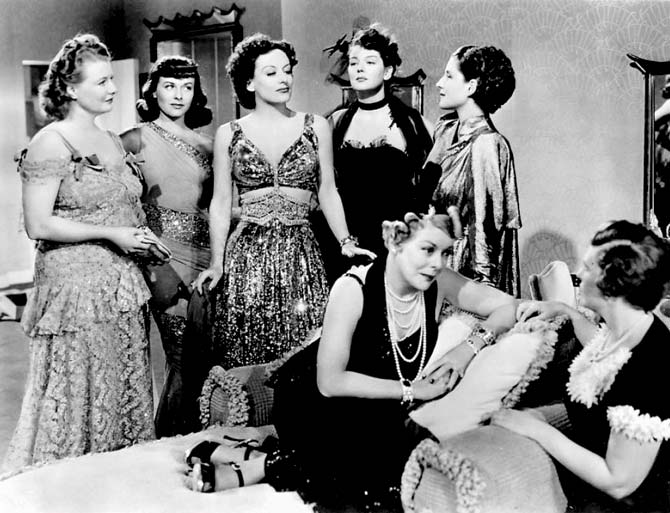Decades after The Women and The Handmaid's Tale were written, it is a relief that we have finally grown the claws to tear into patriarchy


The Women (1939) still holds the massive distinction of having an all-female cast, with at least 130 speaking roles for women
ADVERTISEMENT

The traffic in Mumbai had a role to play, too. I was in an Ola cab, on my way back from The Bagel Shop, the restaurant equivalent of comfort food, or my go-to place whenever I have a ton of work. Instead of focussing on the standstill nature of the cab, thanks to rain and traffic, I opened my laptop, connected to the free Wi-Fi and started strolling through YouTube videos, when I chanced upon the trailer for The Women, since I'd been reading about Norma Shearer, a 1930s Hollywood star. Then I found an open link to watch the film and went through 30 minutes of it before I finally reached home and continued with the rest in bed.
The Women is by no means a feminist film. Adapted by Anita Loos and Jane Murfin from a long-running play of the same name written by Clare Boothe Luce, it was released in 1939 and is set in high society, with the bulk of scenes between the saloons and drawing rooms of Manhattan and the hotels of Reno, where Park Avenue women have to go to get a divorce. But the most fascinating aspect of the film is that it not only has no male star, there isn't a single male actor on screen. Men are the absent present, and patriarchy is the subtext. The film still holds the massive distinction of having an all-female cast, with at least 130 speaking roles for women. Jeanette Winterson, one of my favourite writers, wrote a piece for The Guardian in 2004, ahead of the film's re-release as part of a George Cukor retrospective - Cukor was the film's male director, reminding audiences how the film was initially promoted, "as a bitch-bath; throw the girls in together, turn up the heat and watch them fight it out. And they did - on and off the screen. Thanking her top-billing co-star, Norma Shearer, [Joan] Crawford said: 'I love to play bitches, and Norma helped me in this part." Winterson breaks down the over-simplified subtext: "If you believe the message of this movie, women cannot be trusted - with each other, with themselves, and certainly not with men. The only stable relationships within the group are between mother and daughter across two generations, presumably because they are not in competition. And of course, the competition is for those invisible marvels - the men."
And yet, I was able to hold my feminist claws in check, because it was rather interesting to see how The Women managed to depict how women were victims of the times, always at a disadvantage when it came to property and careers. It reminded me of a bitingly poignant line in the first episode of Bruce Miller's television adaptation of Margaret Atwood's dystopian 1985 novel, The Handmaid's Tale, when Offred's voice-over speaks about her mistrust towards Ofglen, "The truth is we're watching each other. She is my spy and I am hers." She suspects and assumes Ofglen to be a "pious little shit." Later in the episode, when Ofglen, who is supposed to be her walking companion pauses in front of an ice cream place, she makes a comment about how their salted caramel was so amazing, it was better than sex.
"I always thought you were such a true believer," Offred says.
"So were you. So frickin' pious. They do that really well. Make us distrust each other."
I'd like to believe that so much has changed since both these texts were first written, that many of us are finally woke enough to realise that the real enemy is neither women nor men, it's patriarchy, and that both genders have suffered, however unequally, at its hands. But like the sheep-like Norma Shearer in The Women, who allowed herself to be defeated by her husband's infidelity, says to her mother when she finally feels strong enough to stand up for herself, "I've had two years to grow claws, mother. Jungle red."
Deliberating on the life and times of Everywoman, Rosalyn D'Mello is a reputable art critic and the author of A Handbook For My Lover. She tweets @RosaParx. Send your feedback to mailbag@mid-day.com
 Subscribe today by clicking the link and stay updated with the latest news!" Click here!
Subscribe today by clicking the link and stay updated with the latest news!" Click here!






